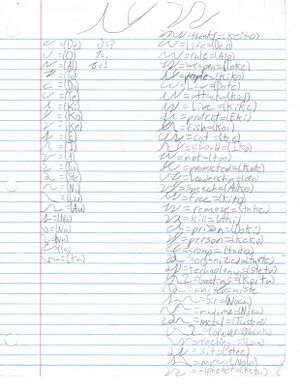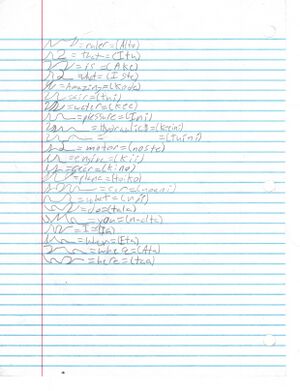Koale language
| Koale Koal | |
|---|---|
| Regulated by | Lideor uf þe kiynɑ |
| Spoken in | |
| Total speakers | 1 |
| Type | Artlang |
History
There are currently four periods in the language of Koale.
Old Koale
The first version of Koale was made in mid-late 2020, it had only four letters made (De, O, Al, and To)
Cursive-Old Koale
The second version of Koale started in the February of 2021 it was then edited to become much more distinct from the first version including a more cursive like script.
Koale V2:


Middle Koale
Middle Koale has 27 letters (De, O, Al, To, Do, Te, Ki, Ko, E, I, A, Tu, Ste, Lu, Au, Ni, No, Na, Nu, La, Ta, U, Pl, Im, Li, Ze, Lm) Unlike in Old Koale it has Latin characters symbolize the letters, instead of just being the way to sound them. Most of the words of the Middle Koale language are based off of previous version, but some words are edited to add consistency, easy of saying, or remove confusion.
New Koale
Letters
A /eɪ/, B, K, D, E /i:/, Ɛ/ɛ, F, I /ɪ/, J /jɪ/, L, M, N, O /o/, Ɑ/ɑ, P, Þ/þ /θ/, R, C /s/, T, U /u:/, V, W, Y, Z
Letter Combinations
iy /ɑɪ/
yj /g/
iyg /ɑɪg/
ae /æ/
ɑɛ /ə/
oe /ɔɪ/
aw /aʊ/
zj /ʒ/ (zh)
vvɛ /v/
nnɛ /n/
ɛr /ər/
ch /ʃ/
tch /tʃ/
tc /t͡s/
Grammar
- used to signal to not connect sounds in a word, without pausing Example: w-ɛ (wɛ)
' is used for breaks in a word, not used pronounced when writing prefixes, and suffixes
Example: K'or (K, or)
| is used to indicate a noun is possessive, it makes a /si:/ sound
Example: Þɑn| kitsɑe = /Thänsi: kɪtsə/ = His cat
//Sounds
If r is at the end of a word it makes the sound of ɛr /ər/
Example:
Cɑlzjr /Sɑlʒər/
Adjetives always come after the nouns they describe
Example:
Armj brovɛn
Adverbs always come after the verbs they describe
Example:
Vyɑt her kle
If a sentence is only about a single person put their name, and, or title at the begining of the sentence
Example:
Cyon Frɛkinɑ, Þɑn yjon tu chɑp.
Suffix, and Prefix layering
Example:
Wɑrnkr'il'cu'tiyt (Workers)
Suffixes, and prefixes do not have to be in any order when layered, and also have no limit to the amount placed on a word,
but every suffix, or prefix must have an ' between it and the previous, even if they do not normally have an '
Prefixes
proc = before
lindzj (root and suffix only) = time
cɛc = relating to talking
luɛ = partial
leɑ = whole
Ɑlu = legislative
minkro = small
wilj = long
ni' = negative
nyɛ' = opposite
cɑ' = unspecified plural amount
Tenses:
Vae' = Past Tense
Wuv' = Current Tense
Nul' = Future Tense
Suffixes
r'il (Turns verbs into adjetives)
'þjzj (Turns nouns into adjetives)
'jt (Turns a noun into an adjetive)
i-yj (Turns words into verbs) (Uneeded, Only used in Songs, an Poems)
'cu (unspecified plural amount)
|snɛ (Makes nouns until a (, . ;) into being apart of that land)
viynte (Similar to ism in English)
tiyt (used at the end of some nouns (specified in Words.txt) to signify being used in government (Military, Postal serivce, etc...))
lɛndzj = time
vɑrt = (notes what someone eats, turns woord from noun into an adjetive)
n / ɑn = have been / have
Example:
Uc on vlonten (We have been allied)
Tenses:
vir = Past Tense
win = Current tense
l'ip = Future Tense